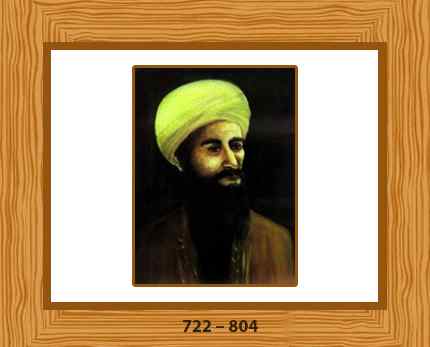Names and works of Known Medieval Scientist/discoverers happened to be Muslims...
Jabir Ibn Haiyan (722 – 804): Also known as Geber. The father of Arab chemistry known for his highly influential works on alchemy and metallurgy. Abu Mūsā Jābir ibn Hayyān (Arabic: جابر بن حیان, Persian: جابرحیان, often given the nisbahs al-al-Bariqi, al-Azdi, al-Kufi, al-Tusi or al-Sufi; fl. c. 721 – c. 815), also known as Geber, was a prominent Muslim polymath: a chemist and alchemist, astronomer and astrologer, engineer, geographer, philosopher, physicist, and pharmacist and physician. Born and educated in Tus, he later traveled to Kufa and his father came from Syria (bilad al-Sham) .
Jabir was a natural philosopher who lived mostly in the 8th century; he was born in Tus, Khorasan, in Iran (Persia), then ruled by the Umayyad Caliphate. Jabir in the classical sources has been entitled differently as al-Azdi al-Barigi or al-Kufi or al-Tusi or al-Sufi. There is a difference of opinion as to whether he was a Persian from Khorasan who later went to Kufa or whether he was, as some have suggested, of Syrian origin and later lived in Persia and Iraq.
His ethnic background is not clear, but most sources reference him as a PersianJābir professes to draw his inspiration from earlier writers, legendary and historic, on the subject. In his writings, Jābir pays tribute to Egyptian and Greek alchemists Zosimos, Democritus, Hermes Trismegistus, Agathodaimon, but also Plato, Aristotle, Galen, Pythagoras, and Socrates as well as the commentators Alexander of Aphrodisias Simplicius, Porphyry and others. A huge pseudo-epigraphic literature of alchemical books was composed in Arabic, among which the names of Persian authors also appear like Jāmāsb, Ostanes, Mani, testifying that alchemy-like operations on metals and other substances were also practiced in Persia.
 Muhammad ibn Musa Al-Khwarizmi (780 – 850)
Muhammad ibn Musa Al-Khwarizmi (780 – 850)Abū ʿAbdallāh Muḥammad ibn Mūsā al-Khwārizmī (Persian: عَبْدَالله مُحَمَّد بِن مُوسَى اَلْخْوَارِزْمِي), earlier transliterated as Algoritmi or Algaurizin, (c. 780 – c. 850) was a Persian ] mathematician, astronomer and geographer during the Abbasid Caliphate, a scholar in the House of Wisdom in Baghdad.
Muhammad ibn Musa al-Khwarizmi was born in 780 CE at a place called Khwarizm which is a part of present day Khiva, Uzbekistan. Like many other thinkers and scientists of his time he also moved to Baghdad which was center of learning of science and philosophy in the middle ages. He studied the sciences and mathematics at House of Wisdom established by Khalifa Ma’mun,
which included the translation of Greek and Sanskrit scientific manuscripts. He worked and lived in Baghdad where died in the year 850 CE.In the twelfth century, Latin translations of his work on the Indian numerals introduced the decimal positional number system to the Western world. His Compendious Book on Calculation by Completion and Balancing presented the first systematic solution of linear and quadratic equations in Arabic. In Renaissance Europe, he was considered the original inventor of algebra, although it is now known that his work is based on older Indian or Greek sources. He revised Ptolemy's Geography and wrote on astronomy and astrology.
http://muslimmedianetwork.com/mmn/?p=1929well you can read more at that link but., those who read Quran, hadith and life story of Prophet of Islam Muhammad the basic ingredients of Islam must realize that,
Science & Islam or for that matter Science & any religion are fundamentally incompatible,. Frankly speaking THERE WERE NO MUSLIM SCIENTISTS IN THE HISTORY OF ISLAM. In the same way, there were no Christian scientists., Jewish Scientists, Hindu scientists, Buddhist scientists. They were all rations thinkers/free thinkers exploring the science of their times with in their limitations. In fact some of the names often Islamic intellectuals of 21st century hyphenate as Muslim Scientists may not even be Muslims but apostates of Islam.. such as Avicenna (980-1037) and Averroes (1126-1198),